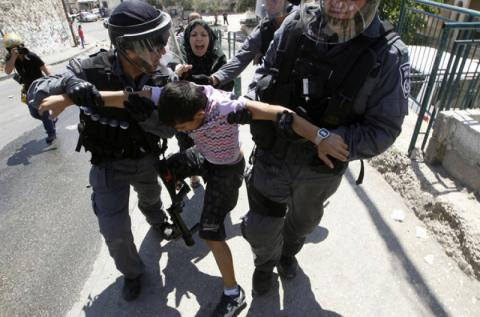
On 13 May 2016, the United Nations Committee against Torture (CAT) published its Concluding Observations following the submission by Israel of its fifth periodic report and the review sessions held on 3 and 4 May 2016. During the review, the Committee members raised a number of issues including the arbitrary detention of Palestinians under the administrative detention regime, including minors, the practice of torture and the punitive demolition of Palestinian homes.
On the Applicability of the Convention Against Torture in the Palestinian Territories
During the session, the Israeli delegation maintained that the Convention did not apply in the Palestinian Occupied Territories (OPTs) – i.e. the West Bank and Gaza –, arguing instead that the laws of armed conflict were applicable. On that particular question, the Committee concluded that the Convention was applying "to all territory and persons under the jurisdiction of the State party," including the Occupied Territories since Israel exercises directly effective control on them, citing the Advisory Opinion of the International Court of Justice (ICJ).
On the Absolute Prohibition of Torture
The Committee expressed concern over the practice of torture of Palestinians deprived of liberty. Several NGOs raised cases of detainees subjected to different forms of torture and ill-treatment, including beatings, sleep deprivation and placing detainees in stress positions, which the Israeli delegation described as being "exceptional measure of interrogation." These acts of torture or ill-treatment were perpetrated by law enforcement officials mainly from the Israel Security Agency (ISA) and the Israeli Defence Forces (IDF), particularly during the arrest and interrogation, including to extract forced confessions. The Committee thus reaffirmed the absolute prohibition of torture and ill-treatment recommending Israel to ensure that interrogation methods contrary to the Convention are not used during interrogation under any circumstances.
Juvenile detainees
The Committee's experts were concerned that Palestinian minors remain exposed to torture and ill-treatment, including to obtain confessions following interrogations in the absence of a lawyer or a family member. The Committee has also been informed of instances in which Palestinian minors were given confessions to sign in Hebrew, a language many do not speak. The fact that most of these children are detained in facilities inside Israel does not only constitute a grave breach of the Fourth Geneva Convention, but also hinders access to their relatives who live in the OPTs as many of them are denied entry permits to Israel, based on undisclosed "security grounds." This was the case of the 12-year-old student Dima Al-Wawi who was sentenced by the Israeli Ofer Court to four and a half months in prison for "carrying a knife in her backpack, attempting to kill Israeli settlers and threatening Israel's security."
Degrading Punitive Measures
Since October 2015, there has been an escalation of violence between Israelis and Palestinians, resulting in the death of 30 Israelis and more than 200 Palestinians. Israel responded with disproportionate measures, such as punitive house demolitions of alleged perpetrators and the withholding of their bodies from their family. In January 2016, Alkarama documented the case of Shafeeq Halabi's family, whose house in Surda, a village north of Ramallah, was demolished in reprisal against Halabi's son Muhannad who was shot dead by the police three months earlier for stabbing Israelis. During the session, Israel claimed that the practice of house demolition was only used to "deter future perpetrators of terrorism." The Committee denounced such a practice, calling upon Israel to take all the necessary measures to put an end to the policy of house demolition as well as the delay of returning bodies, since both measures constitute cruel, inhuman and degrading punishments.
What Next?
The Committee against Torture required Israel to provide, within a year, relevant information on the implementation of the following priority recommendations:
• Adopt the measures necessary to ensure, in law and in practice, that all persons deprived of liberty, are afforded all legal safeguards from the very outset of the deprivation of liberty, including the rights to be assisted by a lawyer and to be brought before a judge without delay;
• End the practice of administrative detention;
• Ensure that the deprivation of liberty of minors, irrespective of the charges brought against them, is a last resort;
• Ensure that all instances and allegations of torture and ill-treatment are investigated promptly, effectively and impartially, and that alleged perpetrators are duly prosecuted and, if found guilty, punished with sentences that are commensurate with the gravity of their acts;
• Adopt the legislative and other measures necessary to ensure the compulsory audio-visual recording of all criminal suspects' interrogations, including those of persons accused of security-related offences.
Alkarama will keep monitoring the human rights situation in the OPTs and calls upon local civil society organisations to take an active role to ensure that the above recommendations are implemented in view of forthcoming review. Israel is requested to submit its sixth periodic report by 13 May 2020.
For more information or an interview, please contact the media team at media@alkarama.org (Tel: +41 22 734 1008)
